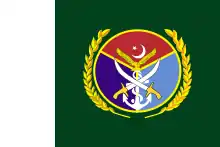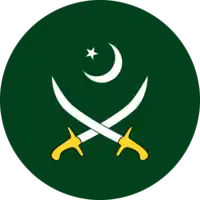Shamim Alam Khan
General Shamim Allam Khan Urdu: شميم ىالم; born 18 August 1937), NI(M), SBt, SJ, is a retired four-star rank army general in the Pakistan Army, who served as the Chairman Joint Chiefs of Staff Committee, appointed in this capacity in 1991 until retiring on 1994.[3]
Shamim Alam Khan | |
|---|---|
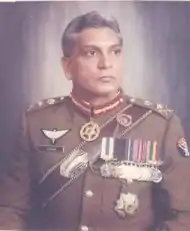 Shamim Alam Khan | |
| Birth name | Shamim Allam |
| Born | 18 August 1937:208[1] Shillong, Meghalaya, India (Present-day in Meghalaya, India.) |
| Allegiance | |
| Service/ | |
| Years of service | 1954–1994 |
| Rank | |
| Service number | PA-7292[2] |
| Unit | |
| Commands held | Chairman Joint Chiefs of Staff Committee XXXI Corps, Bahawalpur Chief of General Staff, Army GHQ II Corps, Multan Armoured Corps COS I Corps, Mangla |
| Battles/wars | Indo-Pakistani war of 1965 Indo-Pakistani war of 1971 |
| Awards | |
Biography
Shamim Alam Khan was born in Shillong, Meghalaya in India, into an Urdu-speaking family on 18 August 1937.:208[1] His father, Mahboob Alam Khan, was an officer in the Indian Civil Service who worked at an administration position at the Survey of India.[4] His mother, Nisa Begum, was a housewife.[4] His father, Mahboob Alam, had nine children with Nisa among all joined the respected branches of the Pakistan Armed Forces.[4]
After the partition of India in 1947, the Allam family moved from Bangalore to Rawalpindi via train, witnessing the violence and riots that was taking place in the trains at the time of the partition in 1947.[5] Eventually, Mahboob Alam eventually found the employment at the Survey of Pakistan.[5]
After his matriculation, Alam went to attend the Lawrence College where he earned the diploma, which allowed to him to attend the Government College University (GCU) in Lahore, Punjab, Pakistan.[5] However, he left his studies at the GCU after he joined the Pakistan Army in 1954 which directed him to attend the Pakistan Military Academy in Kakul.[5] In 1956, he passed out in the class of 14th PMA Long Course from the PMA Kakul, earning a commission in the 20th Lancers, Armoured Corps.[5] In 1958–60, Lt. Alam joined the elite Special Service Group (SSG), eventually was selected to be trained with the United States Army's Special Forces in Fort Bragg in North Carolina, United States.[5]
Upon returning, Major Alam participated in the second war with India in 1965, commanding a company against the Indian Army and his actions of valour earned him with the Sitara-e-Jurat by the President of Pakistan in 1966.:36[6] In 1967–70, Maj. Alam went to the United Kingdom where he attended the British Army's Staff College in Camberley, and served in the 28th Cavalry in the Chamb sector on the western front of the third war with India in 1971.[5] After the war, Maj. Alam went to attend the National Defence University, along with his brother Lt-Cdr. Shamoon, as both graduated with MSc in War studies.[5] For sometime, Lt-Col. Shamim served on a brief stint as an instructor at the Air War College in Islamabad.[5]
War and command appointments in the military
In 1979–80s, Brig. Shamim served as the Chief of Staff in the I Corps, stationed in Mangla, before commanding the independent armoured brigade stationed in Balochistan.[5] In 1983-85, Major-General Shamim was given the command as GOC of the 1st Armoured Division in Multan.[5]
In 1987-88, Maj-Gen. Shamim's promotion was eventually deferred and overlooked by then-army chief and President Zia-ul-Haq when he only promoted the officer to the command assignment of his choosing.:121[7] However, Prime Minister Mohammad Junejo interfered in this matter, and eventually he was promoted to the command assignment with the officer of Zia's choosing.:121[7]:16[8]
In 1988, Lt-Gen. Shamim was posted on his first formation commanding assignment as the field command of the II Strike Corps, stationed in Multan, Punjab, Pakistan, which he served until 1989 when he was elevated as the Chief of General Staff (CGS) at the Army GHQ in Rawalpindi.[9] On April 1991, Lt-Gen. Shamim was made the field commander of the XXXI Corps, stationed in Bahawalpur, but this command assignment only lasted a few months when President Ghulam Ishaq Khan announced to promote to the Lt-Gen. Shamim to the four-star rank– he supersedes no one as he was the most senior army general in the military.:29[10]
Chairman joint chiefs
On 8 November 1991, Gen. Shamim took over the Chairmanship of the Joint Chiefs of Staff Committee, and later went on to play a decisive role in support of Gen. Abdul Waheed, then-chief of army staff, to secure the resignations of both President Ghulam Ishaq and Prime Minister Nawaz Sharif to oversee the nationwide general elections in 1993.:234[11] On 26 November 1992, Gen. Shamim was appointed to the ceremonial post as Col-in-C of the Armoured Corps, which he remained until 18 December 1996.[12] In 1994, Gen. Shamim seek his retirement after completing his tenureship in 1994.:123[13]
Gallery
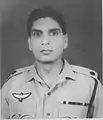 Commanding an SSG company
Commanding an SSG company As a Lieutenant Colonel
As a Lieutenant Colonel Receiving the highest military award of Jordan
Receiving the highest military award of Jordan Receiving the National Order of the Legion of Honour
Receiving the National Order of the Legion of Honour Receiving the Sitara-e-Jurat
Receiving the Sitara-e-Jurat The Sitara-e-Jurat
The Sitara-e-Jurat Receiving the Turkish Armed Forces Medal of Honor
Receiving the Turkish Armed Forces Medal of Honor Receiving the Nishan-e-Imtiaz
Receiving the Nishan-e-Imtiaz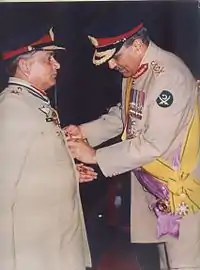 Receiving the Hilal-i-Imtiaz
Receiving the Hilal-i-Imtiaz Receiving the Sitar-e-Basalat
Receiving the Sitar-e-Basalat Family of Shamim Alam Khan
Family of Shamim Alam Khan
References
- The Army Quarterly and Defence Journal. West of England Press. 1994. Retrieved 21 December 2017.
- The Gazette of Pakistan. 1979.
- "General Shamim Alam Khan". lawrencecollege.edu.pk. Lawrence College Ghora Gali Murree. Retrieved 25 December 2017.
- Editorial contribution, News desk writers (11 September 2015). "The Alam Brothers in the Pakistan Armed Forces". The Nation. Islamabad: The Nation, 2015. The Nation. Retrieved 22 December 2017.
- Amin, A.H. (April 2002). "Remembering Our Warriors". www.defencejournal.com. Islamabad: Defence Journal. Retrieved 22 December 2017.
- Illustrated Weekly of Pakistan. Pakistan Herald Publications. 1966.
- Abbas, Hassan (2015). Pakistan's Drift Into Extremism: Allah, the Army, and America's War on Terror. Routledge. ISBN 9781317463283. Retrieved 22 December 2017.
- Hussain, Mushahid; Hussain, Akmal; India), Centre for Policy Research (New Delhi (1993). Pakistan: problems of governance. Konark Publishers.
- Khaled Ahmed. "The Death of Zia-Ul-Haq" Archived 2009-01-27 at the Wayback Machine Criterion Quarterly, April - June 2007. Issue - Vol. 2 No. 2
- Impact International. News & Media. 1991. Retrieved 25 December 2017.
- Summary of World Broadcasts: Asia, Pacific. British Broadcasting Corporation. 1993. Retrieved 25 December 2017.
- "COLONEL IN CHIEF-ARMOURED CORPS-01". www.pakarmymuseum.com. Retrieved 25 December 2017.
- Sehgal, Ikram ul-Majeed (2006). Defence Journal. Ikram ul-Majeed Sehgal. Retrieved 25 December 2017.
External links
| Military offices | ||
|---|---|---|
| Preceded by Mian Muhammad Afzaal |
Chief of General Staff 1989 – 1991 |
Succeeded by Asif Nawaz |
| Preceded by Iftikhar Ahmed Sirohey |
Chairman Joint Chiefs of Staff Committee 1991 – 1994 |
Succeeded by Farooq Feroze Khan |
